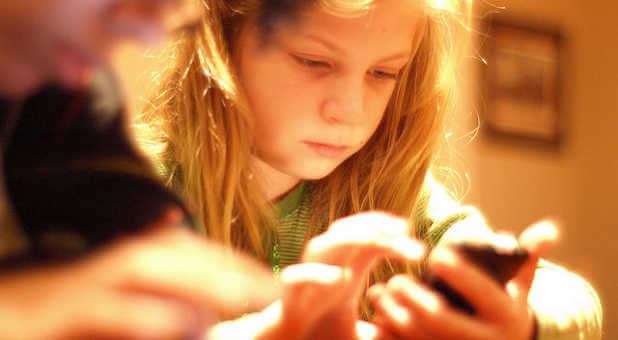When is the last time you highlighted an article so much that the whole thing was yellow when you were finished? For me, it was just yesterday. I read the new report on “Media and Young Minds” from the American Academy of Pediatrics.
Like many people, I am very concerned about the number of young children I see using old phones and iPads of various sizes. Even if the game being played is developmentally age-appropriate, it still grieves me. These children are with adults who could be interacting with them. They could be learning from others and bonding with people. They’re being allowed to be self-absorbed and self-centered.
For example, on Friday, a young boy was walking in a crowded airport while playing a game on a mini iPad. If I wouldn’t have moved, he would have walked right into me. The adults with him seemed oblivious. Or they were aware but weren’t concerned. Or they were aware but gave up trying to change his behavior.
I grieve for the adults too. They seem to be choosing something easy—children who entertain themselves—rather than something better: interacting with children. Adults are missing out on the bonding too.
Perhaps you read my book Screens and Teens and are aware of the five big lies technology use is teaching our young people. Partly because of these lies, the longer we wait before exposing children to technology, the better.
But there are many reasons to delay and avoid technology use altogether. And when using it, there are important guidelines to follow. Very important!
Allow me to highlight a few conclusions from the report. For example, you’ll read about the value of interacting with kids while they’re using technology. Maybe the finding that children’s obedience improves when parents decrease their own technology use will appeal to you. Or how about the dangers of always using technology to soothe children? The statements about this common occurrence are among the most important, in my opinion.
I pray the following will be thought-provoking. I pray you’ll consider making changes if they seem appropriate. Please share this post with those in your circle of influence you may be concerned about. For those who want to read the entire policy statement, it is available here.
- “Children younger than 2 years need hands-on exploration and social interaction with trusted caregivers to develop their cognitive, language, motor, and social-emotional skills. Because of their immature symbolic, memory, and attentional skills, infants and toddlers cannot learn from traditional digital media as they do from interactions with caregivers, and they have difficulty transferring that knowledge to their 3-dimensional experience. The chief factor that facilitates toddlers’ learning from commercial media (starting around 15 months of age) is parents watching with them and reteaching the content.”
- “It is important to emphasize to parents that the higher-order thinking skills and executive functions essential for school success, such as task persistence, impulse control, emotion regulation and creative, flexible thinking, are best taught through unstructured and social (not digital) play, as well as responsive parent–child interactions.”
- “Heavy parent use of mobile devices is associated with fewer verbal and nonverbal interactions between parents and children and may be associated with more parent-child conflict. Because parent media use is a strong predictor of child media habits, reducing parental media use and enhancing parent–child interactions may be an important area of behavior change.”
- “For parents of children 18 to 24 months of age who want to introduce digital media, advise that they choose high-quality programming/apps and use them together with children, because this is how toddlers learn best. Letting children use media by themselves should be avoided.”
- “In children older than 2 years, limit media to one hour or less per day of high-quality programming. Recommend shared use between parent and child to promote enhanced learning, greater interaction and limit setting.
- “Avoid digital media use (except video-chatting) in children younger than 18 to 24 months.”
- “For children ages 18 to 24 months of age, if you want to introduce digital media, choose high-quality programming and use media together with your child. Avoid solo media use in this age group.”
- “For children 2 to 5 years of age, limit screen use to 1 hour per day of high-quality programming, co-view with your children, help children understand what they are seeing, and help them apply what they learn to the world around them.”
- “Avoid using media as the only way to calm your child. Although there are intermittent times (e.g., medical procedures, airplane flights) when media is useful as a soothing strategy, there is concern that using media as strategy to calm could lead to problems with limit setting or the inability of children to develop their own emotion regulation.”
Your thoughts? Maybe go back and skim these points and choose some to think more about. Or read the short report to see what else the authors recommend. What might you want to implement? What will you do? And what have you been doing well regarding technology? Feel good about it! {eoa}
Dr. Kathy Koch is the author of Screens & Teens: Connecting With Our Kids in a Wireless World.












































